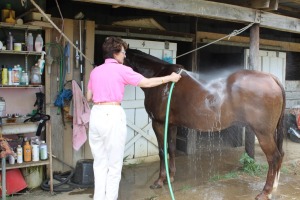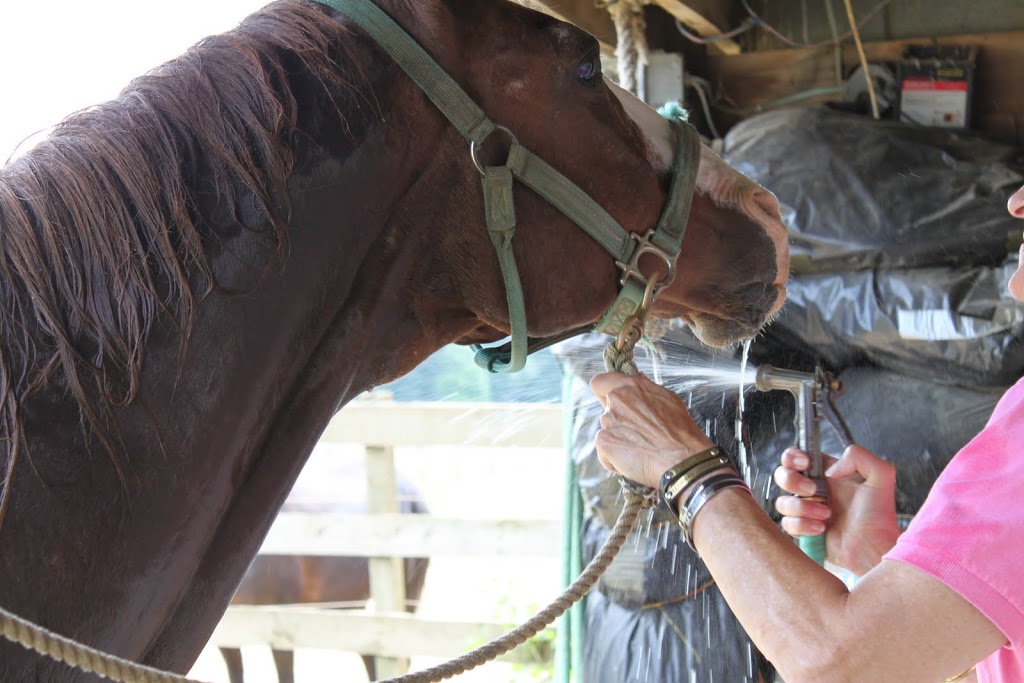Looking for something fun to do next week? Come to the Equine Science Center’s Open House from 12 pm to 1 pm on Tuesday, July 12th at the Equine Exercise Physiology Laboratory on College Farm Road on the George H. Cook Campus in New Brunswick! If you ever were curious about what we do at the Equine Science Center, this is a great event for you to find out! Join Dr. Karyn Malinowski as she explains why horses make such great research models for exercise physiology and the various types of research we do at the Center. Guests will also be able to see one of the research mares gallop full speed on our 21-foot equine treadmill…what a treat! This event is free of charge, but it is asked that you pre-register by calling the Equine Science Center at (732) 932-9419.
 Speaking of treadmills and exercise, staying hydrated (especially while exercising) on these hot summer days is very important…not only for humans but horses too! A source of clean water should be available at all times to your equine pals to ensure good health and performance. Did you know that the average horse drinks between 8 to 10 gallons a day, but may go as high as 15 to 20 gallons during high-intensity training? That’s 720 glasses of water! If the horse sweats for a prolonged period of time during training or competition, it will need to drink more water and electrolytes than normal to replace its losses. Electrolytes are salts that help the body’s cells communicate efficiently, such as potassium, sodium, chloride, and calcium. Although electrolytes for horses usually come in a solid or powdered form, many popular sports drinks like Gatorade contain electrolytes to help humans maintain their supply while exercising. This is one of the many reasons why horses make great models for human exercise physiology; horses and humans are pretty similar after all!
Speaking of treadmills and exercise, staying hydrated (especially while exercising) on these hot summer days is very important…not only for humans but horses too! A source of clean water should be available at all times to your equine pals to ensure good health and performance. Did you know that the average horse drinks between 8 to 10 gallons a day, but may go as high as 15 to 20 gallons during high-intensity training? That’s 720 glasses of water! If the horse sweats for a prolonged period of time during training or competition, it will need to drink more water and electrolytes than normal to replace its losses. Electrolytes are salts that help the body’s cells communicate efficiently, such as potassium, sodium, chloride, and calcium. Although electrolytes for horses usually come in a solid or powdered form, many popular sports drinks like Gatorade contain electrolytes to help humans maintain their supply while exercising. This is one of the many reasons why horses make great models for human exercise physiology; horses and humans are pretty similar after all!


Comments (2)
Anonymous
Jul 09, 2011
McKeever KH, Eaton TL, Geiser S, Kearns CF, Lehnhard RA. Age related decreases in thermoregulation and cardiovascular function in horses. Equine Vet J. 2010 Nov;42 Suppl 38:220-7. doi: 10.1111/j.2042-3306.2010.00259.x
http://www.ncbi.nlm.nih.gov/pubmed/21059010
Elaine
Dec 11, 2015